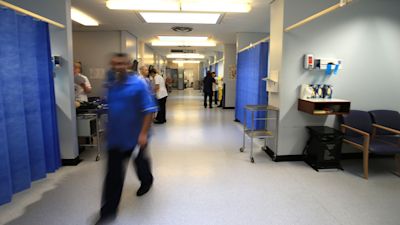Almost 140,000 people waiting more than a year to start hospital treatment in England

Video report by ITV News Health Editor Emily Morgan
Almost 140,000 people in England are having to wait more than a year to start hospital treatment, an increase of 138,000 on the year before.
Figures released by NHS England show that in September 2020, 139,545 people were having to wait more than 52 weeks to start hospital treatment, while in September 2019 the comparable figure was just 1,305.
The most recent figure was the highest for any month since September 2008.
NHS England also said 1.72 million people were having to wait more than 18 weeks to start treatment in September 2020, down from a high of 1.96 million in August, but sharply up on the equivalent figure for September 2019, which was 672,112.
The figures for September 2020 are likely much higher due to the impact of the coronavirus pandemic which saw routine and non-urgent operations cancelled as the NHS dealt with the deadly respiratory disease.
As the second wave hit in recent weeks, many hospitals have once again had to cancel non-urgent operations.
Black and Asian people ‘up to twice as likely to be infected with Covid-19
'Structural racism' explanation masks disparities over Covid, expert warns
As well as those waiting to start treatment, the numbers of people having to wait more than six weeks for key diagnostic tests, such as MRI scans, non-obstetric ultrasounds or gastroscopies, is up more than 381,000 on September 2019.
A total of 420,445 patients were waiting for one of 15 standard tests, in September 2020.
The equivalent number waiting for more than six weeks in September 2019 was 38,750.
The number has fallen in recent months, however, after peaking at 571,459 in May 2020.
While people have been having to wait longer for routine treatments and test, A&E attendances at hospitals continue to be below levels of a year ago, according to the latest figures from NHS England.
The health service said the fall is “likely to be a result of the Covid-19 response” – suggesting that people are still staying away from A&E departments because of the coronavirus outbreak.
A total of 1.6 million attendances were recorded in October 2020, down 26% from 2.2 million in October 2019.
The year-on-year drop in A&E attendances of 26% in October compares with falls of 20% in September, 19% in August and 30% in July.
Emergency admissions to A&E departments at hospitals in England also showed a fall last month, down 14% from 563,133 in October 2019 to 481,846 in October 2020.
NHS England again said this is likely to be a consequence of the coronavirus outbreak.
The total number of people admitted for routine treatment in hospitals in England was down 27% in September compared with a year ago.
Some 209,562 patients were admitted for treatment during the month, down from 288,230 in September 2019.
The year-on-year decrease recorded in August was 43%, and in July the drop was 55%.
Urgent cancer referrals made by GPs in England increased in September on both the same month in 2019 and also in the past few months.
NHS England figures show that a total of 199,801 urgent cancer referrals were made in September 2020, up from 195,196 in September 2019 – a rise of 2%.
This compares with a year-on-year drop of 15% in August, 19% in July and 21% in June.
However, urgent referrals where breast cancer symptoms were present – though not initially suspected – were down from 13,475 in September 2019 to 10,963 in September 2020, a fall of 19%.